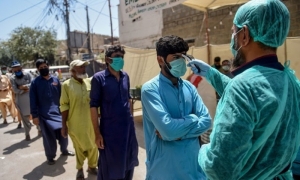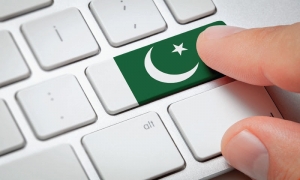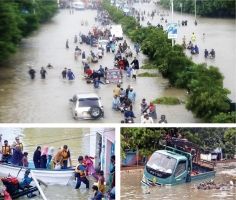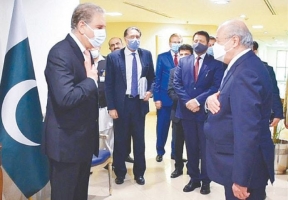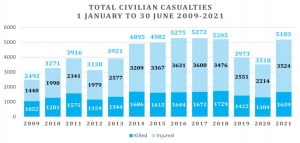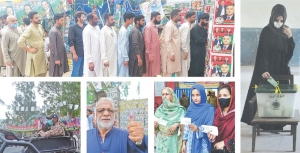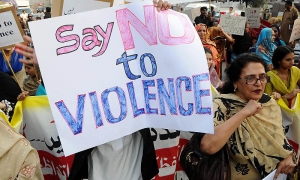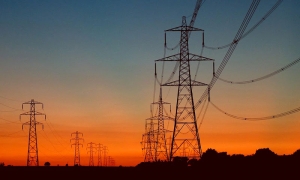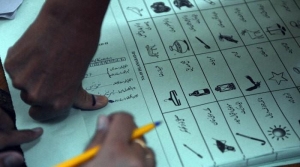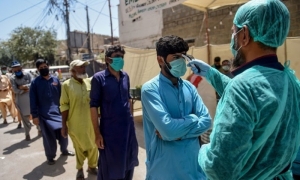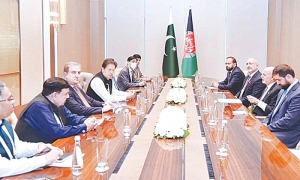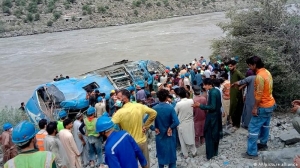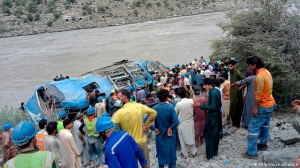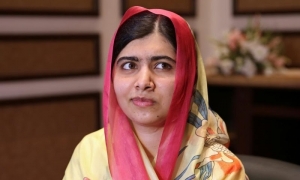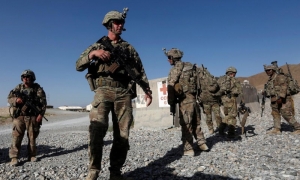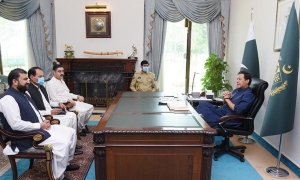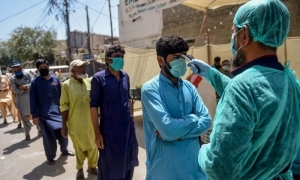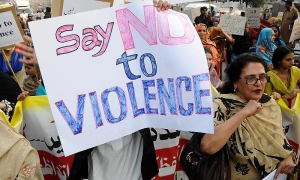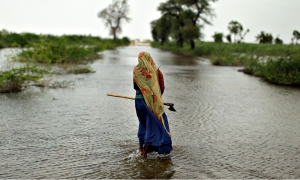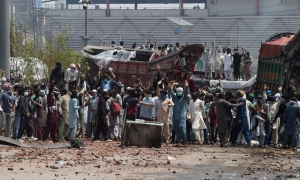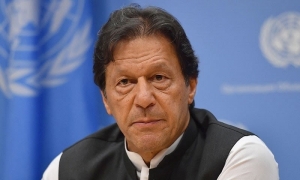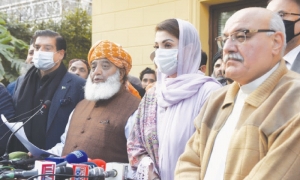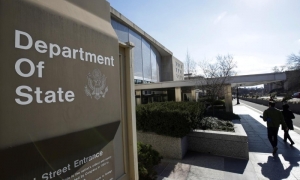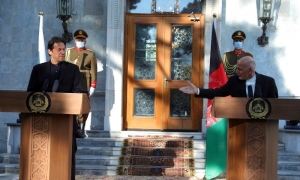|
In Focus
By Apoorva Sudhakar
On 16 July, Adviser to PM on Commerce and Industry Abdul Razak Dawood, in an interview with Gulf News, said that Pakistan aimed at enhancing regional connectivity, especially to boost commercial ties with Central Asia. Dawood termed this a geoeconomic strategy. He said, “Pakistan is aiming to build strong business ties with the Central Asian states under its Silk Route Reconnect Policy to tap into over $90 billion economy and offer them access to Pakistani seaports” adding, “Improving access to Russian and European Union markets is also vitally important for Pakistan.”
Andrew Korybko, in The Express Tribune, lists five reasons behind Pakistan’s “geoeconomic strategy.” First, Pakistan’s stake in Afghanistan; second, the aim for a trilateral platform between Pakistan, Afghanistan and Uzbekistan (PAKAFUZ); third, an entry into market potentially worth USD 90 billion; fourth, strengthening the Economic Cooperation Organization (ECO); fifth, boosting itself and its partners in the region at the global level.
Pakistan’s tilt towards Central Asia did not begin recently. In 2015, the then Commerce Minister said the CPEC project would help Pakistan tap into Central Asia’s economy and make the country a regional economic hub. Recently, on 15 July, Prime Minister Imran Khan visited Tashkent to attend the “Central and South Asia: Regional Connectivity. Challenges and Opportunities.” On the same day, Pakistan and Uzbekistan agreed to finalise a Preferential Trade Agreement to increase bilateral trade.
Other than economic interests, Pakistan also looks at the energy sources in Central Asia. In January, the construction of a portion of the Central Asia-South Asia Regional Trade and Transmission Project (CASA-1000) commenced. The CASA-1000 is a 1,270km transmission line which is proposed to transfer excess hydropower from Kyrgyzstan and Tajikistan to Pakistan through Afghanistan.
Experts believe that a strong relation between Pakistan and Central Asia would also assist Afghanistan stabilise itself to the benefit of Islamabad, and the region. “CARs have influence and can neutralize and exert pressure in Northern Afghanistan” while “Pakistan has influence in the southern belt of Afghanistan.”
Therefore, by focusing on all the above issues, Pakistan aims to secure a key role in the region, increase connectivity and boost economic ties and energy relations.
In Brief
INTERNAL
No matter what a woman wears, the person who commits rape is responsible, says PM Khan
On 28 July, PM Imran Khan clarified his stance on the rising sex crimes in Pakistan stated that his comments were deliberately taken out of context and that he solemnly holds only the rapists responsible for rape, asserting that he has never blamed victims. He said, “No matter what a woman wears or how provocative she is, the person who commits rape is responsible. The victim is never responsible. My comments were taken out of context. We were simply talking about the Pakistani society and the rising number of sex crimes, including those against children. And when I spoke about ‘pardah’, which is a part of Islam, I was addressing everyone.” (“No matter what a woman wears, the person who commits rape is responsible: Imran Khan,” The Express Tribune, 28 July 2021)
Hepatitis killing three to four times more people than Covid-19, says experts
On 27 July, health experts and medical scientists warned, “Hepatitis is three to four times more lethal viral infection in Pakistan where around 300 to 325 people are dying daily due to complications of hepatitis B and C,” adding, “on the other hand, Covid-19 deaths hardly cross the figure of 100 in a single day. So there is a need to have equal focus on the prevention, screening and treatment of hepatitis B and C in the country. It needs collective effort from the health fraternity, government and the masses. We have to move fast before it goes out of control.” They said that the hepatitis B and C viral infections are a “pandemic within a pandemic” stressing the need to focus more on the issue. (Imran Ayub, “Hepatitis killing three to four times more people than Covid-19, warn experts,” Dawn, 28 July 2021)
POA blames IPC, PSB for the decline of sports in Pakistan
On 27 July, the Pakistan Olympic Association (POA) alleged that the Inter-provincial Ministry (IPC) and the Pakistan Sports Board (PSB) were mainly responsible for the decline of sports in the country while the POA is not responsible for sports development in the country. The POA pointed out that the IPC made a false claim that it had sent a summary to the Prime Minister for the preparation of the athletes who have qualified for the Tokyo Olympics. Additionally, the association also criticised the PSB for the unutilised sports funds worth Rs 440 million to the finance ministry and in the Olympic year instead of spending it on the preparations of the athletes for the Tokyo Games. (“IPC, PSB responsible for decline of sports in Pakistan: POA,” Dawn, 28 July 2021)
Drug peddlers are a threat to national security, enemies of humanity, says COAS
On 28 July, COAS General Qamar Javed Bajwa while visited Anti-Narcotics Force headquarters said that drug peddlers and those involved in its production are a threat to national security and relentless enemies of humanity, adding, “Drug money is being used for promotion of terrorism and therefore, it is important that drug dealers are dealt with iron hands.” (“Drug peddlers are threat to national security, enemies of humanity: COAS,” The Express Tribune, 28 July 2021)
PSDP spending exceeds FY21 target, says Minister for Planning and Development
On 27 July, federal development spending in 2020-21 nominally exceeded its target of Rs 650 billion, marking the highest development fund utilisation since 2011-12. He said, spending under the Public Sector Development Programme (PSDP) in the last financial year remained Rs 659 billion or 101.4 per cent of the annual target. He said, “In a year of Covid restrictions, this exceptionally high development spending reflects (the) resolve of PMIK to accelerate growth.” (“PSDP spending exceeds FY21 target: Asad,” Dawn, 28 July 2021)
PM submits reply to defamation suit after four years
On 27 July, in a written reply submitted in response to a defamation suit filed in 2017 by Leader of Opposition in National Assembly Shehbaz Sharif, PM Imran Khan told a court that one of his friends had told him that someone known to him and also the Sharif family had approached him with an offer to pay billions of rupees if he could convince him (Khan) to stop pursuing the Panama Papers case before the Supreme Court. (“Panama Papers case: PM submits reply to defamation suit after four years,” Dawn, 28 July 2021)
PROVINCES
Khyber Pakhtunkhwa: Polio workers hold demonstration over non-payment of dues
On 26 June, polio workers held a demonstration against non-payment of their dues and warned that they would not take part in the upcoming anti-polio drive if their dues were not cleared by the authorities concerned soon. Additionally, they complained that officials of the health department never acknowledged their efforts and they did not pay dues of the polio workers in time. (“Polio workers hold demonstration over non-payment of dues in Khar,” Dawn, 28 July 2021)
Punjab: PTI and PML-N set face each other in Sialkot’s PP-38 by-poll
On 28 July, the ruling PTI and the opposition PML-N are set to clash again in a by-poll for a provincial assembly seat from Sialkot (PP-38, Sialkot-IV). On 27 July, Deputy Commissioner Tahir Farooq said that 165 polling had been established for the election. Thirty polling stations have been declared highly sensitive and six sensitives. (Abid Mehdi, “PTI, PML-N set to slug it out in Sialkot’s PP-38 by-poll,” Dawn, 28 July 2021)
ECONOMY
SBP expects the current account deficit to be 2-3 per cent
On 27 July, the State Bank of Pakistan (SBP) Governor while announcing the Monetary Policy for the next two months said, “Given expected resilience in remittances and an improving outlook for exports, the current account deficit is expected to converge towards a sustainable range of 2-3pc of GDP in FY22.” The current account deficit fell to only 0.6pc of GDP, the governor added, “This is the lowest current account deficit in 10 years, supported by all-time high exports and remittances.” (Shahid Iqbal, “SBP expects current account deficit to be 2-3pc,” Dawn, 28 July 2021) Additionally, the bank decided to maintain the policy rate at seven per cent. (“SBP maintains policy rate at 7pc,” Dawn, 28 July 2021)
IMF revises up Pakistan’s real GDP growth rate to 3.9 per cent
On 27 July, the International Monetary Fund (IMF) revised up its projection for Pakistan’s real Gross Domestic Product (GDP) growth rate to 3.9 per cent. Previously, in April 2021, the IMF had projected Pakistan's real GDP to grow at 1.5 per cent in the year 2021 despite a higher projected rate of 3.0 per cent by the State Bank of Pakistan (SBP). (“IMF revises up Pakistan’s real GDP growth rate to 3.9%,” The Express Tribune, 28 July 2021)
EXTERNAL
FO rejects US report criticising country’s judicial system
On 27 July, Foreign Office Spokesperson rejecting the comments made against its judicial system in the latest US report said, “We take strong exception to the gratuitous and unwarranted comments made in the report on Pakistan’s judicial system,” clarifying that the country’s courts were independently performing their functions in accordance with the Constitution. Additionally, the spokesperson said, “The allegations to the contrary are firmly denied as factually incorrect and misleading.” (“Pakistan rejects US report criticising country’s judicial system,” Dawn, 28 July 2021)
NSA, ISI chief in the US for talks on Afghanistan, other bilateral issues
On 26 July, National Security Adviser (NSA) Moeed Yusuf and the Director-General of Inter-Services Intelligence (ISI), Lt. Gen. Faiz Hameed, arrived in the US for talks with their American counterparts on Afghanistan and other issues of bilateral interests. The visit comes amid the US’s renewed efforts to formulate a regional response to the Afghan crisis aimed at preventing a Taliban takeover in Kabul. (“NSA, ISI chief reach US for talks on Afghanistan, other issues,” Dawn, 28 July 2021)
US embassy detachments itself from Noor Mukaddam murder
On 27 July, the US embassy in Islamabad distanced itself from the murder of Noor Mukaddam, in which the main accused is a US citizen Zahir Jaffer saying, “In a foreign country, US citizens are subject to that country’s laws. When Americans are arrested abroad, the Embassy can check on their well-being and provide a list of lawyers, but cannot provide legal advice, participate in court proceedings or effect [affect] their release.” (“US embassy distances itself from Noor Mukaddam murder,” The Express Tribune, 28 July 2021)
COAS meets with Chief of South African National Defence Forces General
On 27 July, COAS General Qamar Javed Bajwa met with Chief of South African National Defence Forces General Rudzani Maphwanya. During the meeting, matters of mutual interests, regional security situation and defence, training and security cooperation between the two countries were discussed. Additionally, the COAS said that Pakistan attaches great value to its relations with South Africa, adding, “Pakistan views South Africa as a key country in African continent and we appreciate South Africa’s role towards regional peace, security and development of African region.” (“South Africa appreciates Pakistan’s role for Afghan reconciliation process,” The Express Tribune, 28 July 2021)
Pakistan wants Russia to increase shareholding up to 49 per cent
On 28 July, The News International reported Pakistan has asked Russia that it has no money to fully fund its 74 per cent shareholding in the USD three billion projects of Pakistan Steam Gas Pipeline (PSGP), asking Russia to raise debt financing upto USD 1.4 billion against its shareholding for the project. This development has raised the concern of many if the huge amount of Rs 295 billion collected in the head of GIDC (gas infrastructure development cess) by the Finance Ministry till August 2020 has been utilized by the government. (“Pakistan Stream Gas Pipeline: Pakistan wants Russia to increase shareholding up to 49pc,” The News International, 28 July 2021)
ON AFGHANISTAN
‘The US really messed up in Afghanistan’ says PM Khan
On 28 July, PM Imran Khan said that the United States “really messed it up in Afghanistan” and the only good solution to the country's situation is through a political settlement that is “inclusive” and involves all factions, including the Taliban. He reiterated that there was “no military solution” to the problem. He added, “The worst situation in Afghanistan would be a civil war and a protracted civil war, and from Pakistan’s point of view, that would be the worst-case scenario.” (“'US really messed up in Afghanistan': PM Imran urges inclusive political settlement,” The Express Tribune, 28 July 2021)
|


